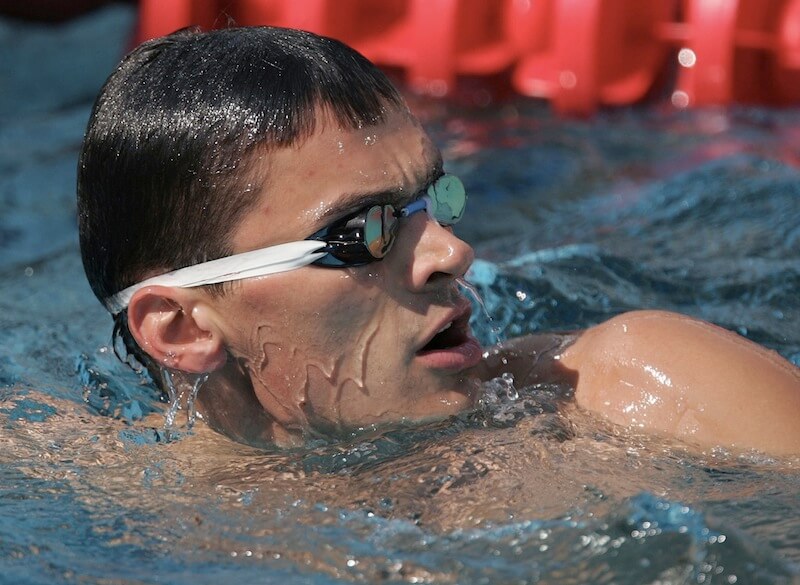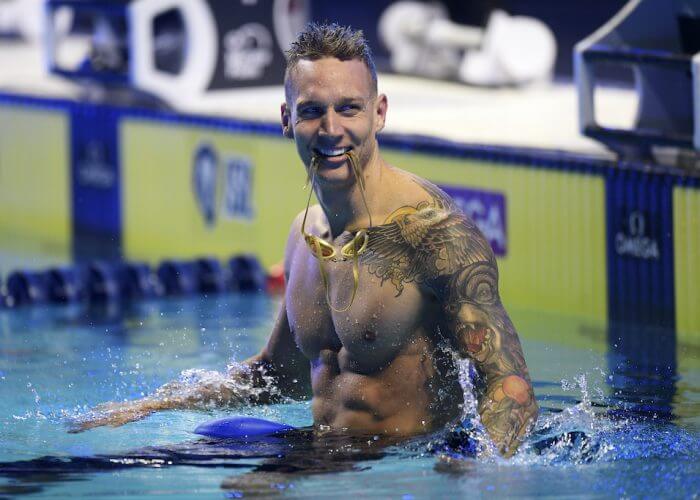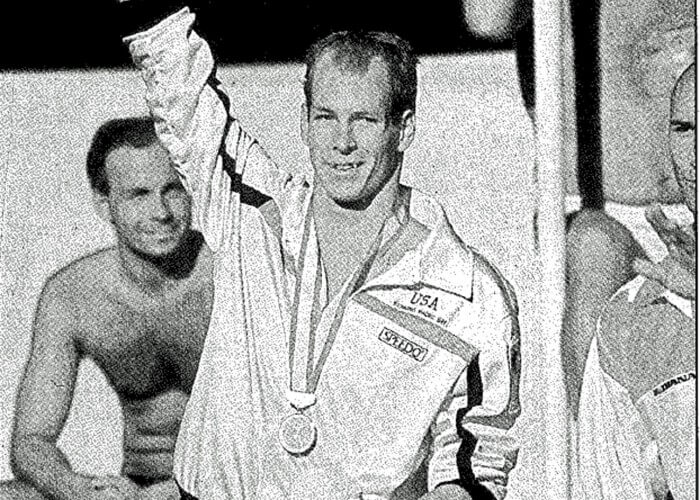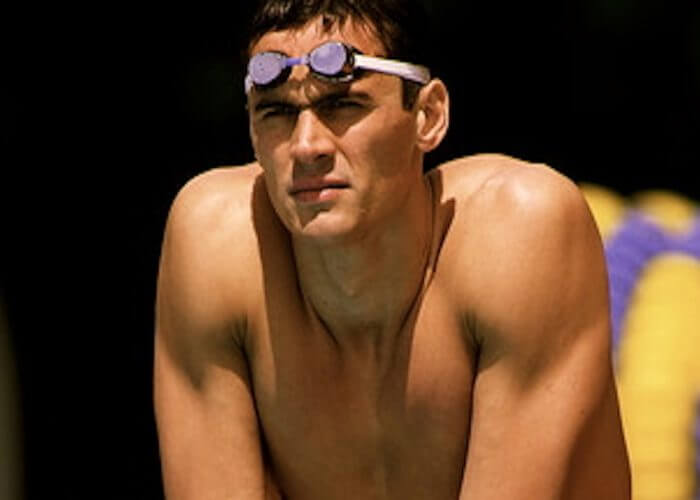20 Years Since The Dash Crown Passed From King Tom Jager To Tsar Alexander Popov (VIDEOS)

Today marks the 20th anniversary of the 21.64 World record set by Alexander Popov over 50m freestyle. The Russian Sprint Tsar, two historic doubles and four Olympic 50-100m freestyle crowns in the treasury, set the new dash pace at nationals and trials in Moscow heading for a third Olympic Games at Sydney 2000.
As with any world record, the history either side of it is a big part of the context and meaning of pioneering moments. It was 1992 when Popov took the crown as world’s best sprinter ahead of Matt Biondi and Tom Jager – but it was June 16, 2000 before he could finally say he had the edge of speed on Jager down one length of a pool.
Dealing first with what happened next, Popov’s mark was sunk almost eight years on in a frenzy of shiny suits, Australian Eamon Sullivan‘s 21.56 the first of six standards set in 22 months that left the dash bar where it has remained ever since: 20.91, by Cesar Cielo in domestic competition 13 days before the shiny suits were sunk themselves.
A decade on, the world textile best is the fourth fastest performance ever, the 21.04 of American Caeleb Dressel for the World title in Gwangju last July. He, Britain’s Ben Proud (21.11, 2018), France’s Florent Manaudou (21.19, 2015), the 2012 Olympic champion, and Brazil’s Bruno Fratus (21.27, 2017) are the only four swimmers in textile suits to make the all-time best 40 performances over 50m freestyle.
That 21.64 of Popov’s is now the 210th best performance all-time on a list dominated by shiny suit times that stacks up like this in 2020 and a year that may go down as the first since 1896 without any swimming world records, as a result of the COVID-19 pandemic:
- 13/20 of the all-time best, including top 3, survive from 2009
- 65 swims among those 210 entries belong to shiny suits
- Of the 145 textile swims, the four aforementioned as the only textile entries in the top 40 account for 66 swims, leaving 79 swims textile swims by others in that best 210 all-time.
On the eve of shiny suits, Popov’s best had survived more than seven and a half years as the pace to beat. By the close of the shiny suits saga, he sat at No15 on the performers list and No63 on the performances list as the best textile suit entry still. Cielo was not all suit and no swimmer, of course, and in June 2010 the Brazilian took over as world-textile pace-setter with a 21.55 at the Paris Open, before Frenchman Fred Bousquet shaved that back.

Caeleb Dressel – Photo Courtesy: Fabio Ferrari/LaPresse
Here is what the world-record progression (0.6sec in 20 years, not 0.73sec in 9 years) list would have looked like without shiny suits – and without knowing what those wearing shiny suits in 2008-09 might have achieved in textile in peak form:
- 21.64 Alexander Popov (RUS) 2000
- 21.55 Cesar Cielo (BRA) 2010
- 21.49 Fred Bousquet (FRA) 2010
- 21.36 Fred Bousquet (FRA) 2010
- 21.34 Florent Manaudou (FRA) 2012
- 21.19 Florent Manaudou (FRA) 2015
- 21.15 Caeleb Dressel (USA) 2017
- 21.11 Ben Proud (GBR) 2018
- 21.04 Caeleb Dressel (USA) 2019
Proud would have been the first British man to hold a world sprint freestyle record.
In Popov’s case, we were talking not just textile but briefs.
The 21.64 pacesetter was not without its controversy: a straight championship race, the swim was not. The lanes either side of the Russian Rocket were empty. There was much said and written about a start as fast as you might get a start to be. A world-record time-trial unfolded, the paperwork for a World-record attempt doubtless part of the archive of paperwork at FINA HQ. What we do know is that Popov, without a shadow of a doubt, was the man to beat over 50 and 100m freestyle for almost a decade and a swimmer you could watch in the tightest of tightest fields and feel that, somehow, it would be his hand that stopped the clock first.
Alexander Popov’s 21.64, June 16, 2000
Sprint Tsar Alexander Popov

Alex Popov – by Patrick B. Kraemer
Born on November 16, 1971, in Sverdlovsk, Alexander Popov (middle name Vladimirovich) is the only man in history to win the Olympic 50m and 100m freestyle titles at two successive Games, and in 1996 was the first since Johnny “Tarzan” Weissmuller in 1928 to retain the 100m crown.
The Russian is assured a special place in the pantheon not only for the highlights of his career but for his longevity at the helm of sprinters. His 13-year international career (1991-2004) is studded with a stunning 45 gems: at Olympic Games, four gold and five silvers; at World Championships, six gold, four silvers and one bronze; at European Championships, a record 20 gold, three silver and two bronze, between 1991 and 2003.
He began swimming at the age of 8 after his father insisted that it was time he overcame a fear of water. Backstroke was Popov’s preference as a junior but coach Gennadi Touretski turned him over and made him the fastest sprinter of the 20th Century, his 21.64 world record in the 50m succumbing to Eamon Sullivan (AUS) in shiny suit in 21.56 on February 17, 2008.
Alexander Popov made his international debut at the European Championships in Athens, 1991, with victory over 100m in 49.18sec, the first of 10 continental crowns in the 50m and 100m freestyle (five on each distance) between 1991 and 2004. His winning time in Athens matched that in which Olympic champion Matt Biondi (USA) had retained the 100m freestyle world title in Perth half a year earlier.
The gauntlet chucked, Alexander Popov arrived in Barcelona for the 1992 Olympic Games as the big threat – untested in global waters – to Biondi’s crowns.
Popov the Pretender became Popov the Champion in 49.02sec in the 100m title. Biondi finished 5th. Two days later, Popov became the first man in Olympic waters to race inside 22sec over 50m, his 21.91 ending the reign of the two men who had dominated the one-lap dash since 1985: Biondi claimed silver in 22.09, Tom Jager the bronze in 22.30.
Which is where we stop the clock.
Tom Jager – The Pioneer Precursor to The Top Pace Of Alexander Popov
“You have to believe in something bigger than yourself – and if you can do that then greatness seems to come to you” – Tom Jager

Tom Jager in 1986 – Photo Courtesy: Swimming World Magazine
Popov’s blast in Moscow this day back in 2000 was a stunner that took out the 10-year-old global mark that had stood to Tom Jager (USA) at what for its time was a blistering ahead-of-curve 21.81.
Jager had already been a pace pioneer over 50m freestyle by the time he went down in history as the first official World record holder, with a 22.32 blast at Pan Pacs in Brisbane on August 13, 1987.
A year earlier, Jager had claimed the inaugural World title in the dash. There could have been no better place to do it: 30 years earlier, at the Melbourne 1956 Olympic Games, Spain had called for the one-length sprint to be recognised as a World-record event and to be reintroduced to the Olympic programme (it was swum in St Louis in 1904, Hungarian Zoltan Halmay the winner).
The proposal was rejected. It took the best part of three decades to get the proposal back on the table – just in time for a clash of American giants in the shape of Tom Jager and Matt Biondi.
Jager clocked 22.32 for the Pan Pacs title ahead of Biondi, the teammate who had held the last world-best time, at 22.33, before his teammate finally matched the 22.32 standard time FINA had set as the pace that had to be matched or bettered to count as the first official bar for the 50m event.
Jager’s rollercoaster ride with Biondi is the stuff of swimming legend and lore. Jager first set the world best at 22.40 at Austin in December 1985. Biondi clocked 22.33 twice, in 1986 and 1987, before Jager defeated him for the Pan Pacific crown Down Under, Biondi’s 22.61 for silver followed by a gap almost inconceivable between second and third in a dash event these days, Andrew Baildon (AUS) on 23.45.
In March 1988, Jager reduced his standard to 22.23 and a year on from Pan Pacs, he and Biondi lined up for the 50m free final at the 1988 Olympic Games. Biondi was the man with a shot at emulating Mark Spitz and his seven gold medals. He got 5 gold in seven medals – and one of the wins unfolded in world-record time in the dash: 22.14.
Jager took silver in 22.36 and 23 years on in an interview for the Washington State University media service, then a coach and cheering on his Pac-12 squad, Jager recalled his 1988 loss as “a killer”. He explained:
“I was a world-record holder when I went in, and I had beaten Matt seven out of nine times. To have that all taken away in 22 seconds. Those are the races that haunt you.”

Tom Jager – Washington State Youtube
The experience – and bronze four years on at Barcelona 1992 – was not what he wanted at the time but it stood him in good stead and offered inspiration to others – or rather the way Jager reacted to Olympic defeat and disappointment did.
Coach Dennis Pursley once told British swimmers the story of how the USA coaches and team at the 1992 Olympics knew that Jager would be distraught at having claimed bronze and not better. They had expected not to see the sprinter again that day of minor spoil. They were wrong. He was their captain – and he was going to show it: Jager appeared in his tracksuit back on the stand and spent the rest of the session cheer-leading for his teammates.
The effect on the USA team was electric: one for all, all for one, come thick or thin, hell or high water.
In 2011, Jager looked back and believed that his duels with Biondi would stand him in good stead as a coach, saying: “I find myself seven years in [my coaching career] and I’m at the Pac-12 level. I’m pretty proud of that. I knew that I had to earn my stripes at a mid-major and work hard in order to prove myself and learn this business.”
Here’s Jager with more recollections of his racing days and the lessons learned and now being passed on:
Those lessons included: never give up. Back to the Pan Pacs, August 20, 1989, in Tokyo and Jager took the crown once more, in a world record of 22.12. Seven months later, he wrote his name into the history books the first man ever to crack 22sec – 21.98:
The same day, March 24, 1990, in Nashville, saw him reduce the mark to 21.81. And there the mark would stay for 10 years until Alexander Popov, the Russian who overhauled both Jager and Biondi as the world’s leading sprint force, clocked 21.64 on June 16, 2000.
In a final won by American Caeleb Dressel in a world textile best of 21.15 in 2017, Jager’s best would have finished 8th – 27 years on.
Jager became head coach at Washington State University in 2011, moving there from the University of Idaho. A 1987 graduate of UCLA, Jager said at the time: “I am excited about the opportunity to coach at one of the best universities in the country. Washington State has a great deal of pride and I look forward to sharing my energy and excitement for the sport of swimming with the team, the athletic department and the university.
“It is a privilege to be a Division I coach and an honor to coach the Cougars as we head into the Pac-12, the best swimming conference in the nation. I look forward to the challenge.”
A native of Collinsville, Illinois, Jager won two relay gold medals at the 1984 Olympic Games, added relay gold and a silver in the 50m free in 1988, and in 1992 claimed yet another 4x100m gold as well as bronze in the 50m free.
His career ended on a high in 1992 not only by virtue of his achievements in the water but more so because he had granted himself the best of memories, as Pursley put it: his last moment on the Olympic deck was not as a bronze medalist in a 50m free but as the captain of a hugely successful USA team.
Restart the Russian clock.
Popov – From Russia With Love For Life In Australia
In January 1993, Alexander Popov followed Touretski to Canberra, where the two were based at the Australian Institute of Sport for 10 years.
At Monte Carlo in June 1994 on Mare Nostrum Tour, the relative calm of a warm-up test on the way to world titles in Rome was shattered by a swell of speed from the Russian, not a seat occupied in the stands alongside us that day, a standing ovation the explanation.
Popov had confined to history Biondi’s 1988 world record over 100m, raising the bar from 48.42 to 48.21.
At the 1994 world championships in Rome, Popov won both sprint events once more, holding off a new American threat, Gary Hall Jr, in both races. It would be the same story at the Olympic Games in Atlanta in 1996, though the margins were much tighter: two days after matching Weissmuller’s 1928 feat by retaining the 100m crown with a 48.74 just 0.07sec ahead of the American, Popov raced level with Hall to 40m before edging ahead to victory by 0.13sec in 22.13.

Alexander Popov by Patrick B. Kraemer
One of the most aesthetic swimmers in history and a man whose technique was a model for generations of sprinters to come, Popov claimed to have an inner clock. It would explain why, no matter how close the race was throughout the 1990s, it rarely felt as though Popov would lose.
Reflecting on his victory by 0.07sec over Hall Jr, Alexander Popov would later say:
“The main reason I looked at the clock was to confirm the feeling that I had won. Whether I won or lost, I always felt the same way. In the crucial, final moments, I was able to release a special kind of concentration and energy, which drove me forwards. I was born with it. I always knew approximately how fast I was.”
Tourestski helped to hone that inner clock, long, steady pacing of perfect skill and technique a part of the preparation of the most decorated sprinter in history. The coach, who has now lived and worked in Switzerland for many years, studied nature in search of tips to the top in the pool. How and why was it possible for birds to migrate over such vast distances? How was it that they could conserve the energy required to cope with such epic journeys? What secrets could be unlocked from their natural movement?
In Popov, Touretski found a swimmer who prospered on a program more akin to that many distance swimmers might recognise – but doing that so that he could be the world’s best sprinter.

Alex Popov – Photo Courtesy: Patrick B. Kraemer
Taking over from Jager and Biondi as the supreme sprinter of the 1990s came with an edge on occasion.
After the 100m final in Atlanta, Popov was asked by a journalist among the U.S. media present at the post-race press conference to name his favourite actors but replied: “I don’t dream about actors and actresses. They should dream about me. I’m reality.”
The line was written up as a sign of arrogance in the Russian sprinter, who was cited as calling Gary Hall Jnr a “loser … from a family of losers”. In all the years and in many interviews with Popov down the years in which I heard him being asked about Hall and others, I never once heard him say anything remotely like that. It seemed out of character in all regards barring this: if he felt a question was stupid, he would give a stupid answer, often followed by a smile that suggested ‘for those in the room who know me, you’ll get that.’ At the Olympics there were many in the room who did not know him or his achievements nearly as well as they might have done.
Alexander Popov gave his 1996 Olympic gold medal for the 100m to Touretski as a token of thanks, saying:
“I have a title and I’m on the result sheet, but Gennadi didn’t get anything from Atlanta, nor from Barcelona. I know how much this particular medal means for him, what it’s worth to him.”
In Moscow 30 days later, Popov was stabbed in the stomach after intervening in a fight between a friend and a watermelon seller. The knife penetrated 15cms, damaging the pleura, the membrane that encases the lungs, missing a kidney by the edge of a blade and slicing an artery. Emergency surgery was followed by three months in rehabilitation.
The incident changed his life: Popov was baptised in an orthodox church shortly after the stabbing. He recovered well enough to defend the European sprint titles at Seville in 1997, and said: “My soul wasn’t damaged, my brain wasn’t damaged, only my body.”
He spoke at a press conference in Seville at which I asked if he could describe his relationship with water. His answer has entered the lore of the sport:
“The water is your friend, you don’t have to fight with water, just share the same spirit as the water, and it will help you move. If you fight the water it will defeat you . We were born in water – it’s like home to me.”
In January 1998, he defended his world title over 100m while suffering his only major defeat of the 1990s, losing the 50m crown to Bill Pilczuk (USA). Defeated at the 1999 European Championships by Pieter Van den Hoogenband (NED), Popov was not done yet: on this day 15 years ago in June 2000, he confined to history Jager’s 10-year-old world record in the 50m freestyle (21.81 to 21.64):
In Sydney at the Olympic Games that September, Popov clocked 48.69sec in the 100m final, the fastest of all his Olympic appearances but a new era had dawned: the champion was the Eindhoven Express, Pieter Van den Hoogenband, in 48.30, after he had set a shock-wave of a world record of 47.84 in the semi-final.
Revival Of A Champion
In 2003, back in Barcelona, the city in which he had claimed his first Olympic crowns, Alexander Popov, now the ‘old man of sprinting’, stunned his rivals with the fastest 100m victory of his career – 48.42, 0.26sec ahead of Van den Hoogenband for the world crown. To boot, he made it a double, claiming the 50m world crown for a last time.
At the 2004 Olympic Games in Athens, he did not make a final and announced his retirement.
When asked whether Ian Thorpe or Michael Phelps were “the greatest swimmer ever”, Don Talbot, the Australian who led his nation to victory over the United States at the 2001 world championships, answered:
“Neither. It’s not just about what you achieve at one particular moment. That counts along the way but longevity of success contributes to greatness. Neither Thorpe nor Phelps can claim that yet. Popov can.”
Phelps, of course, went on to knock all contenders for consistency and longevity of excellence into a cocked hat.
A Towering Career
The Next Generation – & Challenges Ahead
In 2004 Popov, a member of the IOC’s athletes’ commission, stood for the presidency of the Russian Swimming federation. He lost in a battle with the incumbent, Gennadi Aleshin, and commented: “It was a good learning experience. I’m used to winning in the water but there are things I have to learn when it comes to winning in politics.”
Popov married Olympic teammate Daria Schmeleva, 1993 European medal winner in the 200m medley. The couple have two sons, Vladimir (born in 1997) and Anton (born in 2000), and a daughter, Mia (born in 2010).

Vladimir Popov and Sasha Touretski at a training session in Tenero, Switzerland – by Patrick B. Kraemer
Vladimir made good progress in the pool as a contemporary of Touretski’s daughter, Sasha, both of them coached by Popov Senior’s mentor in Switzerland.
When Vladimir was 10, his dad was asked how the sons of swimmers were getting on in the pool. He told me:
“They’re not bad, for their age. I didn’t swim that fast. I’m trying not to put pressure on them but they like swimming and you can’t take that away from them. If they like it you should give them the opportunity.”
Had young Vladimir appreciated who dad was at that stage? “Vladimir does understand, and he asks me tricky questions every now and again. Apart from that, he does like swimming and he wants to swim and that’s the main thing.”

Different suit, Alex Popov by Patrick B. Kraemer
Popov became a member of the International Olympic Committee (IOC) and vice-president of the Russian swimming federation at a time when his country had a big job on its hands tackling doping. The World Anti-Doping Agency, among many others, believes that Russia still has a big job to do, which is why the nation is currently serving a ban from certain major internationals, albeit at a time when there is no action – and therefore no penalty actually being served.
In his racing days, Alexander Popov reached the dizzying heights of an Olympic pioneer and record setter as the most decorated 50-100m man of all-time. The role of bureaucrat is a tricker one. On the FINA Athletes’ Commission, he sat in relative, diplomatic silence at a time when the leadership of the international swimming federation came under pressure to submit to review or face mutiny.
Since then, he has watched the world change, the leadership of FINA grow old and near the end of its days and he has ridden out controversy on dry land. On U.S. Independence Day, July 4, 2019, Popov faced accusations with eight other members of the IOC for taking money in order to vote for the Rio 2016 Summer Olympics.
The former governor of Rio de Janeiro Sérgio Cabral, confronted in court that he gave $2million to Lamine Diack, the former president of the IAAF, the World athletics’ governing body to buy votes. On July 5, 2019, Popov denied the allegations, citing that he did not take any money in return for his vote.
Since then, Alexander Popov has watched the birth of the International Swimming League and a new Pro-beginning for swimming. One of the characters in the mix is Matt Biondi, now an athlete representative who aims to sit on the opposite side of the top tables of sport to that where we have found Popov for a decade and more.
It remains to be seen if two of the greatest sprinters their sport has ever known will swim as one on issues important to athletes or whether they will find themselves racing for victory over the other once more in the years ahead on dry land.




Tsar ?? ?